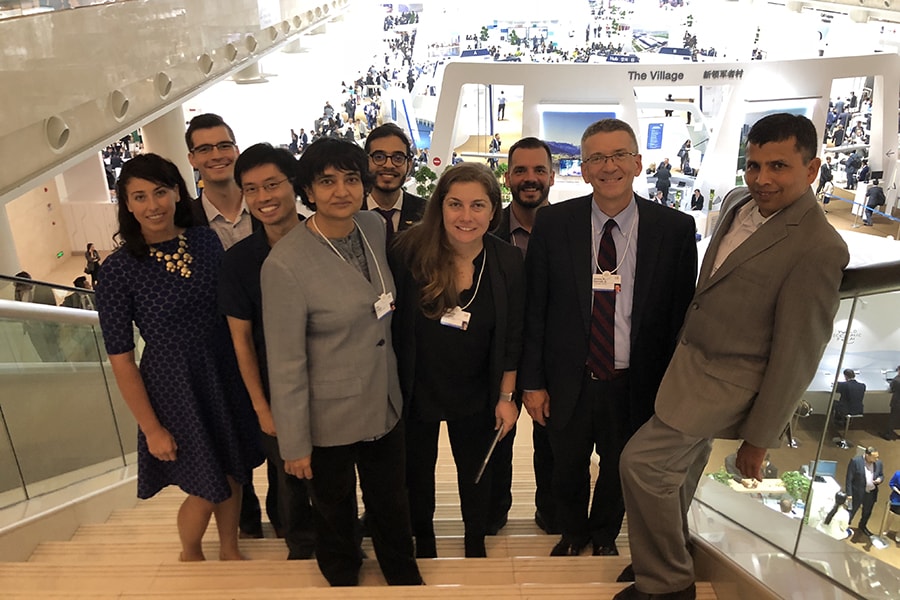Shattering Stereotypes in Davos
CMU's Justine Cassell will teach world leaders about biases and diversity
In the beginning stages of her esteemed academic career, Justine Cassell was a faculty member at MIT. A senior student walked into her design of interactive systems class and was surprised.
"She told me I was her first female professor in college — ever," said Cassell, now a professor in Carnegie Mellon University's Language Technologies Institute and Human-Computer Interaction Institute, and associate dean of CMU's School of Computer Science for technology strategy and impact. "She said seeing me made her wonder if she could also be a professor. Until that point, she had never thought about it."
Justine Cassell and Joy Buolamwini, MIT Media Lab computer scientist and founder of Algorithmic Justice League, discuss opportunities to combat computational bias at the 2019 World Economic Forum.
It was that moment that made Cassell first think about the responsibility of being a role model for female students, and all women in male-dominated fields.
Cassell will again be in the front of a room filled with mostly male faces — those of world leaders, corporate giants and public policy power players — at the 2019 World Economic Forum in Davos, Switzerland. They will gather to listen as Cassell talks about the importance of diversity in the workplace.
This is Cassell's eighth consecutive trip to the global summit, where she has provided presentations and interactive demonstrations such as her Socially-Aware Robot Assistant. She has become an annual presenter at the exclusive conference, which brings together some of the most influential people in the world to discuss the issues that impact society and our planet.
During a 2017 Ideas Lab at the World Economic Forum, Justine Cassell discussed teaching virtual humans the secrets of reading between the lines and how virtual humans are not only improving the development of artificial intelligence but also the understanding of what it means to be a real human.
"Just speaking in Davos makes a difference," Cassell said. "Last year I heard there were more sessions about women's roles than there were women attending as presenters."
Cassell will present in three sessions inside the Congress Center this year. She will first sit down with Williams-Sonoma CEO Laura Alber and World Wrestling Entertainment co-founder Linda McMahon to discuss "The Transformational Force of Female Founders."
"I don't believe that female founders are necessarily better at anything in particular. I don't think they're more maternal, warm, empathetic or any of the other traits that are stereotypically linked to women," Cassell said. "However, research tells us that diverse voices increase creativity by providing multiple perspectives. That's the transformative power of having more women in every role of a company or organization."
When she presents in Davos or elsewhere, Cassell said she stresses the research behind her comments. While the topic may be emotional for her, Cassell wants her audiences to know that it's the science, and not the emotion, that validates her ideas.
"I find that approach works well with CEOs and world leaders who need strategies that can be replicated in their own communities," she said.
Cassell's second presentation in Davos will discuss biases. This includes the necessity of addressing the "Good Old Boys Network" prevalent in the hiring process, especially within technology companies. She also will discuss machine learning algorithms that have proven — albeit probably inadvertently — to be biased against, among others, African-Americans and Asians.
Finally, Cassell will address representational bias: the bias in how technologists have created the ways artificial intelligence acts and talks. Specifically, Cassell is thinking about personal assistants such as Alexa and Siri.
"Why are Siri and Alexa female?" she asks. "Why, when I tell Siri to go away, does it say, 'oh, why, can't we just be friends?' Comments like that make her sound seductive. Apple and Amazon are already getting complaints that children are now talking to their mothers in the same way they order around Siri and Alexa. Kids have already made the jump from the representation of female AI to women."
Cassell will wrap up her week at the forum moderating a panel about new kinds of learning.
Cassell said she realizes that she is still a work in progress, much like the world she wants to change.
"I think biases and a lack of diversity are only changeable if we face our own biases and negative stereotypes," she said. "I actually spend a fair amount of my time saying, 'Wow, I just made a stereotype about that category of person! What am I going to do about the racism or sexism in my own personality?' So if someone like me, who spends her career trying to fix these biases within society, is still sexist or racist, there's a likelihood that many other people are too.
"We can all improve," she said.
